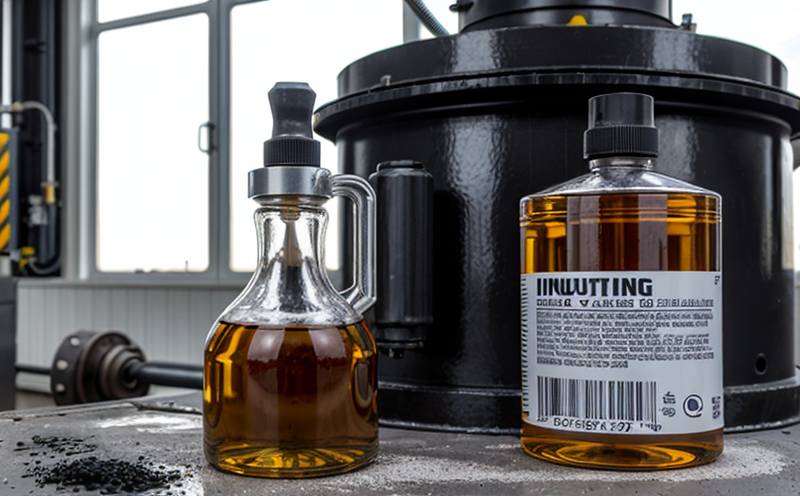ASTM D524 Conradson Carbon Residue Testing of Oils
The ASTM D524 Conradson Carbon Residue Test is a critical analysis method used to assess the carbon content in petroleum products, particularly oils. This test is essential for quality control and ensuring that industrial lubricants meet stringent performance standards.
Carbon residue formation during combustion processes can lead to engine wear and reduced efficiency. By measuring this carbon residue, manufacturers can ensure their products do not degrade over time or under high-temperature conditions, which could otherwise compromise engine performance and lifespan. This test is particularly important for industrial oils used in heavy machinery, such as those found in manufacturing plants and power generation facilities.
The ASTM D524 Conradson Carbon Residue Test follows a precise procedure that involves heating a sample of the oil to a specified temperature (typically 850°C) under controlled conditions. The test measures the weight percentage of carbon residue left after combustion, which is indicative of the oil's chemical stability and quality.
Understanding the significance of this test for industrial applications can help you appreciate its role in maintaining optimal performance across various sectors. For instance, in manufacturing, ensuring that lubricants do not form excessive carbon deposits helps to prevent machinery breakdowns, reducing downtime and maintenance costs. In power generation, the use of stable oils ensures efficient operation without the risk of premature failure.
The ASTM D524 Conradson Carbon Residue Test is crucial for compliance with industry standards and regulatory requirements. It helps in maintaining product quality by providing reliable data on the chemical composition of lubricants, which can influence their performance under stress conditions. This test supports continuous improvement efforts within R&D departments by offering insights into the effects of different additives or processing methods on oil stability.
Moreover, this testing procedure aligns with broader sustainability goals by promoting efficient use of resources and minimizing environmental impact through optimized product performance. By ensuring that industrial oils remain stable over time, manufacturers contribute to longer equipment lifespans and reduced waste generation.
The importance of ASTM D524 Conradson Carbon Residue Testing extends beyond individual companies; it plays a vital role in the global effort towards sustainable manufacturing practices. As industries strive for greater efficiency and lower environmental footprints, tests like this one become increasingly indispensable tools for achieving these objectives.
Scope and Methodology
| Step | Description |
|---|---|
| 1. Sample Preparation | Ensure the sample is representative of the oil to be tested. This may involve diluting the oil with a solvent if necessary. |
| 2. Heating and Combustion | Heat the prepared sample in a furnace at 850°C for five minutes under controlled conditions. |
| 3. Collection of Carbon Residue | Cool the sample to room temperature, then collect the carbon residue formed during combustion. |
| 4. Weighing and Calculation | Weigh the collected carbon residue accurately and calculate its weight percentage relative to the initial mass of the oil sample. |
Why Choose This Test
The ASTM D524 Conradson Carbon Residue Test offers several advantages that make it an indispensable tool for industrial oil testing:
- Precision and Reliability: The test provides precise measurements of carbon residue content, ensuring accurate assessment of a lubricant's stability.
- Regulatory Compliance: By adhering to this standard, manufacturers can ensure their products meet regulatory requirements set by various bodies worldwide.
- Quality Assurance: Regular testing helps maintain consistent product quality and reliability across batches.
- Sustainability: Stable oils contribute to longer equipment lifespans and reduced waste generation, supporting broader sustainability goals.
Incorporating ASTM D524 Conradson Carbon Residue Testing into your quality management processes can significantly enhance the performance of industrial lubricants. This ensures that they perform optimally under various operating conditions while minimizing potential risks associated with poor-quality oils.
Environmental and Sustainability Contributions
- Reduces Waste: By ensuring oil stability, this test helps prevent the formation of harmful carbon deposits, which can otherwise lead to increased waste generation.
- Enhances Efficiency: Stable oils contribute to more efficient equipment operation, reducing energy consumption and operational costs.
- Promotes Recycling: Longer-lasting lubricants mean fewer replacements, promoting recycling practices within the industry.
- Sustains Resources: By optimizing performance through testing, resources are used more effectively, supporting sustainable resource management.
The ASTM D524 Conradson Carbon Residue Test plays a pivotal role in these efforts by providing essential data that informs decisions aimed at improving environmental outcomes and promoting sustainability within manufacturing practices.





